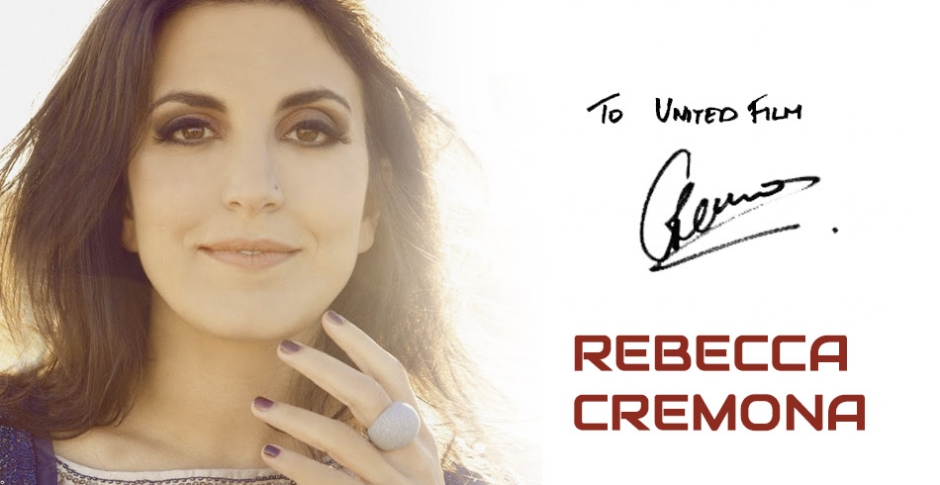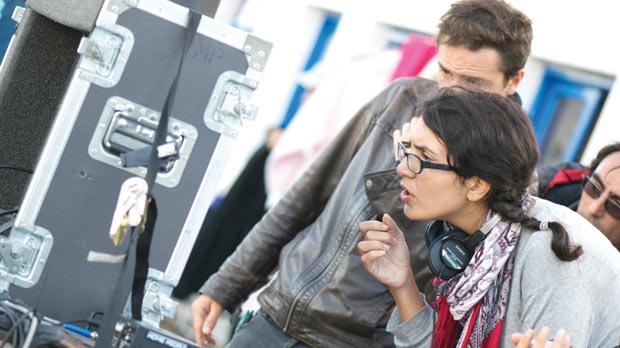Rebecca Cremona: Making film is an art of compromise
Written by Eva Csölleová, Vítek FormánekWhen we spotted the name of director Rebecca Cremona from Malta on the guest list of FebioFest 2016 we applied for an interview. Since we knew nothing about film industry in this country, who better to ask than the first Maltese director who directed a first feature film called Simshar which she also brought onto this festival. Despite her young age of 26, we admired her focus and determination. She has a wise head on her shoulders.
When you decided to be a film director at the age of 16, did you think that it will be twice as hard for you since you come from a country with little film pedigree? Something like trying to become an ice hockey player in Sahara? Did you take it as disadvantage or advantage cos people will look at you with interest and something exotic?
I think it´s a mixture of things that you have mentioned. There are some negative aspects like we don´t have any film school, no infrastructure or heritage of Maltese films, so there are some challenges but the plus side is, as you said, that it´s really rare to have someone from Malta and we have a mixture of cultures since we are between Europe and Africa, which is not usually found. We have many stories that are unique and get lot of interest and also we are rare which is a plus point since there is so much competition in film business that is it hard to stand out. I never had a choice among businesses I would like to do, I always felt that being a film maker is what I wanna do and there is no option for me. That was what I wanted to do and all I do goes towards that. It wasn´t a rational decision, it was a passionate one and I don´t regret it although it is a very difficult route.
You went to England and USA to study. Was it because you wanted to get international experience or because there is no such school in Malta?
Again, it was both. The course I did in England was film theory and literature which for me was like a dream. You know there is still close connection between England and Malta since we were their colony up until 1964 so there are lots of ties. The course in USA was totally opposite to the one in UK, cos it was practical and it was basically just go out and make films which in UK there was mostly theory. So for me it was important to have balance in education both practical and theoretical. It was very interesting to have such culturally varied education and also the network I have from both universities is very diverse which makes you realize that more you work in film business it´s more about those relationships. You know it´s about meeting people along the line, sharing experience, being on the same wave length and we are not discussing only technical things and it is really a pleasure if you meet someone who you can collaborate with. By the way, I paid half the fee from my pocket half from scholarship.
You were working with Steven Spielberg on film “ Munich”. How did you get that job, we guess you didn´t call Amblin Productions and asked Steven for that, did you?
It was actually my first job on the set, it was an internship scheme and I got a letter telling me I got the job at the very day I passed my exams on first degree. I even didn´t have time to go to my ceremony and immediately flew back to Malta where the film was made (apart from Budapest, France and New York). It was the first time Malta introduced this internship scheme for film being shot in Malta. Those productions have to employ three Maltese people as their crew. My job was to make sure there is a connection between cameras and monitors so Spielberg could see what is being filmed, I was responsible for 6-8 cameras and it was not easy cos sometimes I had to run across massive field, sometimes into a big building. I was always on the set, even when erotic scenes were shot, when everybody had to leave, I was the only one who could stay there, it was great job, I was at the heart of action and saw how director works, how he works with actors and I was like a sponge absorbing all these information. Steven called me his Maltese Falcon and he was very professional. He was so well prepared, so well organized, he was in command of everything like timing and blocking the scene. You know Spielberg is not just a director, it´s like an institution, he is very emblematic of certain type of cinema and cinema language. It was incredible to be so exposed. Danger of such experience is, it´s hard to top it, you know. There were actors like Geoffrey Rush or Daniel Craig and it was unbelievable.
Did you ask him for any tips or trick?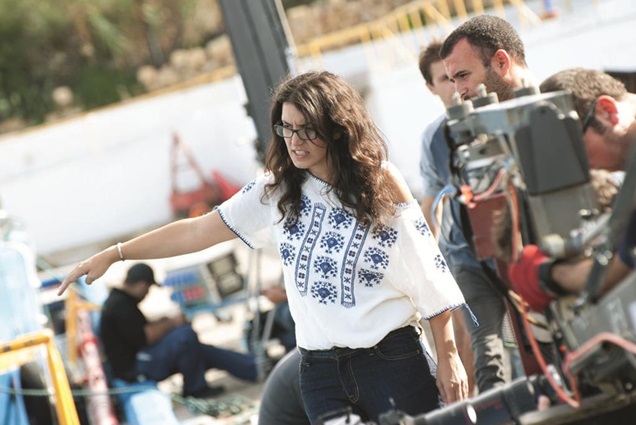
No, I never asked him anything, why should I when he showed me everything.You know although he works with megabudget compare to me. Film is not about budget, it´s about visual language and if you pick up the ways how he observes and speaks to actors, how he decides how to frame and build the scene and if he wants a movement or no movement in the scene and why, you always have to make these decisions regardless of what budget you work with.I don´t even have a picture with him for my portfolio, would you believe that? I think if you ask for a picture with somebody it creates a distance cos you treat them not as themselves but for whey they are.
Your film “ Simshar” was first ever full length feature from Malta. Do you try to be something like ambassador of your film industry and bring attention to it? Was it therefore easier for your to get money for the film?
Again, it was kind of mix of positives and negatives.There were many people excited that some Maltese film maker would make a film with Maltese language and characters.You know, American crews were shooting films like “ Gladiator” in Malta and many local people worked for them.But they have never been making costumes or never have been head of any department.Because of that you get lots of enthusiasm and it is priceless,From financial point of view people obviously asked “What is your track record” and the reply was ”No track record, this is first film”.So I understand this was a risk since people don´t know what to expect from Maltese film.If you see French or Balcan film, you know what you will get but with Maltese????So there was lots of hesitation when it came to investment and distribution.
You mentioned a movie “ Gladiator”.Does it mean you have some studios where are films are made?
No, we don´t have studio or soundstage, We have massive filming tanks where films like Kon tiki or Mobydick were shot and Malta is very good for locations. It has very rich eclectic culture because of colonial history and we have ancient countryside too so that is why Malta can be doubled for Bejrut or Roma and epic sword battles can be shot here.
Business of film making is too much of an art and art of film making is too much of a business
Do you intend to shoot just films somehow connected with Maltese history and help your country to be more known in the world or was Simshar just one off?
I have many Maltese stories to tell and I think it is important to tell them I love stories and I love characters and what is great on film is that it is so universal.I definitely don´t want to limit myself but I will be very happy to make more Maltese films but don´t want to make them only about Malta.
Your film Simshar was made in just 29 days, which is incredible for debut director. Do you think such quick tempo is positive cos everybody works more than 100% and there is no side disturbance or it is negative cos you can´t relax, are under big stress and make mistakes you normally wouldn´t have done?
It was big stress to film it in just 29 days due to low budget. It was difficult cos we were filming on the water, had lots of boats and had big crowds and many children so production wise it was vast. We invested a lot into our preparation and we were ready to go on those shooting days.There are certain benefits cos you are always on your toes and there is certainly a spontaneity .Of course it would have been nice to have had more time and of course we made mistakes. You never have enough time you know, even people with big budgets feel that they don´t have enough time. Every time you finish a film you think you make it differently. But you wouldn´t know that till you do it and it is such a growing process so I think that the day you make a film and you think it´s perfect with no mistakes, that very day you stop growing your process.
It was your first film so was it hard for you to have confidence and command so people would listen to you?
As a director you have many roles and you have to be in command, you have to instruct people but I don´t believe in hierarchy and I believe in collaboration as a key factor cos if you have the best ideas of the world and you don´t have a team, you have nothing. Beauty of the cinema is that director doesn´t know everything, he has overview of things but he is not a specialist so he wants to get the best out of people. He must make sure, they have the urgency and feel that their contribution is important. They don´t give you as much as you can get out of them because what you get out of them is limited since you are not an expert but they give you everything they can and that is much bigger cos you can´t know everything of every department.
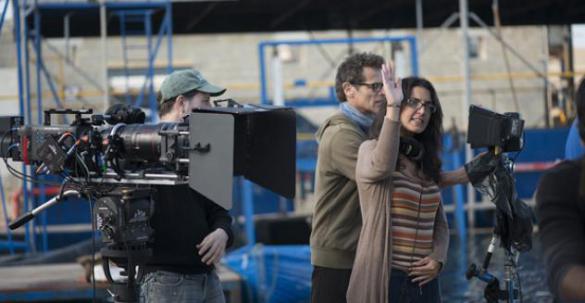 You said you incline to more art and independent films but still enjoy watching mainstream. At this stage do you have to try and be mainstream to get attention and credibility which can bring you more money and more freedom which will lead you to more artistic and independent?
You said you incline to more art and independent films but still enjoy watching mainstream. At this stage do you have to try and be mainstream to get attention and credibility which can bring you more money and more freedom which will lead you to more artistic and independent?
It is like vicious circle and it is also very tricky. You do the mainstream and it get noticed. You have to be honest with you that you are making film and when you make it, it´s the best way for the story. If the story needs to have more traditional approach or if the story needs to be more experimental you should do that. You should always serve story first and foremost as it will take care of itself. People feel when they watch film and they were manipulated and know when directors said” Okay, I will put this in cos it will give me more viewers .If the film is not made in sincerity, people will know it cos audience is smart.
What you said sounds nice but don´t you feel that specially American directors do what you said cos if they, say, make happy end it will them better rating, bigger audience and more money?
Yes, unfortunately film is very expensive and people have to minimize risk, they have to make comfortable people who are taking financial risks. And you have duty not to squander people, that is the difficulty cos there is so much compromise..Making film is art of compromise cos you have to learn when compromise you should make and when.
Why did you choose immigrants topic for your first film? Since you liked the plot or because it is such a big issue globally and mainly in Europe that you felt it may find good audience? Do you intend to always have films with deep message in it?
I was working on that film since 2008 where there already was an immigration wave but not in today´s proportions. The flow was not in media or on agenda .I just came across a story and it was interesting and for my first film I wanted to have some local story, some universal theme. Then I realized it has an international dynamics. When I was aware what was happening on the sea and many people not knowing what is happening I realized it´s urgency.It will be same for the future, when I find an interesting story that has a meaning I will stick with it.
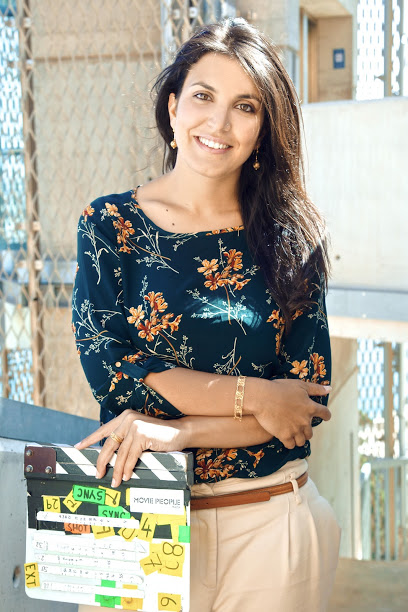 When you make a debut film and it has success like you have, it is a bonus for your further career or it puts weight at your shoulders cos people will expect you only make better films so you can´t afford any slip-up?
When you make a debut film and it has success like you have, it is a bonus for your further career or it puts weight at your shoulders cos people will expect you only make better films so you can´t afford any slip-up?
I can assure you that I put more pressure on myself than anybody ever put on me.I hope I will only make better film. Personally I think it would be a disaster if you made a feature film and it would be a flop. They say it´s harder to make your second film since with your first one you can say” Let´s take a chance with unknown”. In your second film they say “ Let´s have a look at the first film to know what they did there”.
Do you intend to build your own Maltese crew or you will use horses for courses policy depending on where and what will you shoot?
You know you develop relationship with your crew and in Simshar we became like big family cos everybody gave it 300% because of the nature of the project.So it would be nice to have them back for my next film but it depends on locations, time and many other aspects.
What does in fact Simshar means?
It´s a name of the boat and it is Maltese tradition to name boats with amalgamations of the names of the couple. So I thought it would be appropriate to use that name cos we put two stories together.
Did you set up your production company after your first film to be independent?
No I established that before the film. Director has so much work and productions gives you more control over your work but it takes lots of your own time which should be given to directing. Shooting the film is not easy but it is the easiest part. Writing is crucial, getting finance is a nightmare. They say that Business of film making is too much of an art and art of film making is too much of a business.Now with new ways of distribution, with this Netfix when nobody knows how it will work, it is very difficult to distribute it.
How does it work with finding films in Malta, any ministry grants or state funding?
There is big tax rebate up to 27 % and it is available for all films that are being shot in Malta.For Maltese films there is a Filmfund which was established in 2008.My first film was first full length feature film to come out of this fund.
Is there any independent film scene in Malta?
No, because we have no mainstream so we have no underground or overground. There is no platform for independent film, maybe in 10 years time.People start to make short films because that is the best way how to leaarn making feature films.Couple months ago there was another feature film coming so it starts slowly, but surely.


